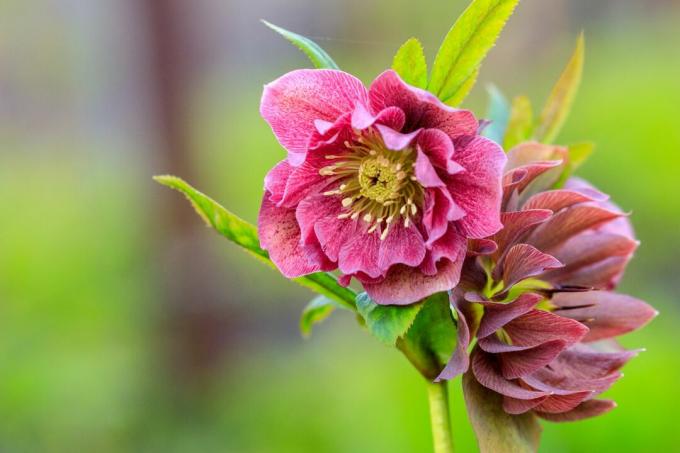The question arises again and again whether the beautiful Christmas roses are poisonous for humans and animals. We are investigating the rumor of the poisonous Christmas rose.

The evergreen Christmas roses (Helleborus niger) are very popular in the home gardens. They can also be used as a potted plant on the balcony or terrace as a floral winter decoration wonderful, because they open their flowers when many other plants are in their hibernation are located. Perhaps you've thought about buying a Christmas rose, but were unsure because you've heard that Christmas roses are poisonous. In this article we will clarify whether there is any truth in this rumor and whether Christmas roses are actually poisonous.
It is anticipated that Christmas roses are actually poisonous. However, that does not speak against planting in your own garden. In the following we will explain why Christmas roses can be dangerous for humans and animals. We will also inform you about the precautionary measures to be taken and how best to proceed in the event of poisoning.
contents
- Are Christmas roses poisonous to humans?
- Are Christmas roses poisonous for cats, dogs and the like?
- Treatment options for poisoning with Christmas roses
Are Christmas roses poisonous to humans?
Yes, Christmas roses are poisonous to humans and therefore not suitable for human consumption. Various toxic ingredients such as saponins and that in buttercups are responsible for this (Ranunculaceae) occurring protoanemonin. In the genus Helleborus In addition, there are the cardiac poison Helleborin and the highly effective steroid saponin Hellebrin, which is similar to the cardiac glycosides of the thimbles (digitalis) has an effect.
Basically, all parts of the plant in Christmas roses are poisonous. However, the strongest Helleborin concentration is found in the rhizome, so that poisoning by snow roses - as Christmas roses are also known - is rarely observed. However, consuming ripe seed pods can also cause severe poisoning. However, it is not recommended today to use it as an emetic or laxative, for which it was used in folk medicine in ancient times.

Tip from the professional: Leaking sap from gardening can cause skin irritation. Therefore, always wear gloves when handling Christmas roses and do not touch your face while gardening.
Are Christmas roses poisonous for cats, dogs and the like?
Yes, Christmas roses are also poisonous for animals. Interestingly, the name "Eberwurz", by which the Christmas rose is also known, comes from the 17th century. Century. At this time the Christmas rose was used in veterinary medicine as a remedy for coughing, poisoning and swine fever. To do this, a hole was stabbed in the ear of the animal in question, through which a piece of Christmas rose root was stuck for a day and night. However, this method has been abandoned today.
Horses can come into contact with the Christmas rose fresh on the pasture or dried in hay. You react with heart problems to the poisonous plant, which in the worst case can lead to death. Among domestic animals, puppies and kittens are particularly at risk, as they could eat the poisonous seeds and roots out of curiosity. If your pet vomits, has diarrhea or shows excessive salivation, you should think about poisoning with the poisonous Christmas rose. Other signs can include cramps, lack of body control, altered breathing rate or a change in the pupil.

You should consult a veterinarian at the latest when you notice the first signs of paralysis in your animal. If you can still see parts of the plant, be sure to take them with you. In this way, the vet knows more quickly what type of poisoning it is. As a precaution, it is advisable to only include Christmas roses in the garden design if animals remain out of reach. If you are a cat owner, Christmas roses are also not suitable as indoor plants in the house or apartment.
Treatment options for poisoning with Christmas roses
Helleborus- Poisoning is rare but not impossible. The effects should not be underestimated, especially with young children. Symptoms of poisoning here are dizziness and collapse. But scratching in the mouth and throat, increased salivation, gastrointestinal complaints or dilation of the pupil also indicate poisoning.
Immediate administration of medicinal charcoal is recommended as a first aid measure. After that, the vital functions must be constantly checked, an emergency call must be made and contact must be made with a poison control center.
More information about Buying and caring for Christmas roses can be found in our special article.



